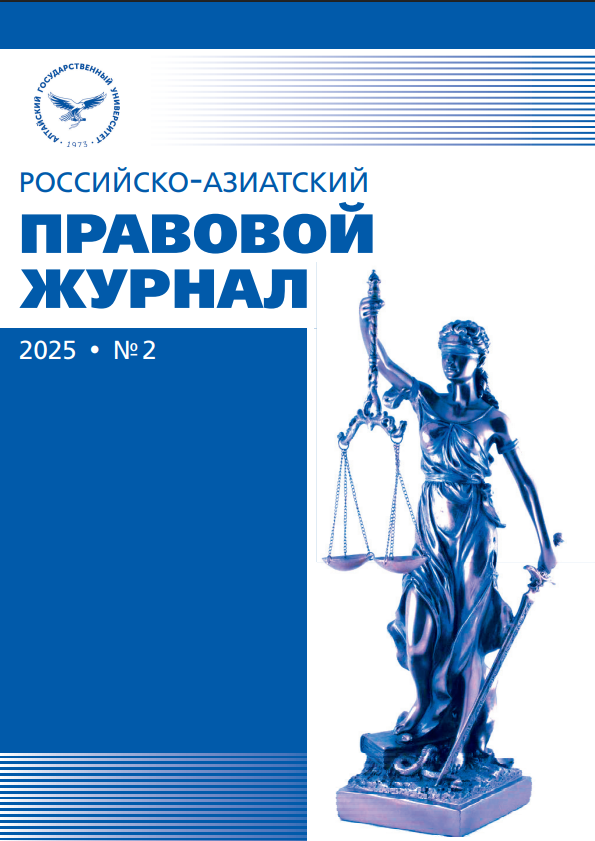PROBLEMS AND PROSPECTS OF CITIZENS' PARTICIPATION IN LOCAL GOVERNMENT IN THE CONTEXT OF CHANGING LEGISLATION
УДК 352.075 ББК 67.400.7
Abstract
The relevance of the research topic is due to the transformation of the foundations of local self-government,which began with the constitutional reform of 2020 and was continued by the adoption of a new Federal Lawdated 03/20/2025 No. 33-FZ “On the general principles of organizing local self-government in a unified systemof local self-government.” state power”, the analysis of which demonstrates a clear reduction in the forms ofdirect implementation of local self-government by the population and participation in it. Despite the openlist of these forms, there are not so many effective and really in demand among citizens. Given that local selfgovernment is the most important democratic institution that allows the population to participate in theexercise of State power at the grassroots level, it is necessary to assist citizens and involve them in solvingissues of local importance in order to effectively implement them. This is possible due to clear legal regulationand informing citizens about the real forms of participation in local government.
Downloads
References
2. Пенизев М.В. Концептуальные проблемы реформы местного самоуправления в России // Российское право: образование, практика, наука. 2022. №4. С. 63–71.
3. Комкова Г.Н., Куликова С.А. Вопросы законодательного регулирования эффективности информационного обеспечения общественного контроля // Известия Саратовского университета. Новая серия. Серия: Экономика. Управление. Право. 2019. Т. 19. Вып. 3. С. 294–301.
4. Михеева Т.Н., Михеев Д.С. Формы непосредственной муниципальной демократии: грядущие трансформации // Известия Саратовского университета. Новая серия. Серия: Экономика. Управление. Право. 2022. Т. 22. Вып. 3. С. 304–309.
5. Троицкая Т.В. Гражданин Российской Федерации — субъект осуществления общественного контроля в России // Известия Саратовского университета. Новая серия. Серия: Экономика. Управление. Право. 2020. Т. 20. Вып. 4. С. 464–468.
6. Ищенко А.В., Евсеева С.А. Проблемы и перспективы развития местного самоуправления в современной России // Конституция Российской Федерации: теория и практика реализации : сб. материалов Всерос. науч.-теор. конф. / отв. ред. А.Н. Осяк, Ю.В. Капранова. Ростов н/Д: Ростов. юрид. ин-т Министерства внутренних дел Рос. Федерации, 2018. С. 65–69.
7. Миронова С.М. Финансово-правовые последствия создания в России муниципальных округов // Право и современная экономика: новые вызовы и перспективы : сб. материалов II науч.-практ. конф. с междунар. участием юрид. фак. СПбГЭУ / под науч. ред. Н.А. Крайновой. СПб. : С.-Петерб. гос. экон. ун-т, 2019. С. 139–148.
8. Казанцева О.Л., Кузина Е.В. Местное самоуправление в системе российской государственности: проблемы и перспективы // Правоприменение. 2022. Т. 6. №3. С. 161–171.
REFERENCES
1. Gritsenko E.V. The right to local self-government in the conditions of digital transformation // Trends in the development of local self-government at the present stage (the view of scientists and practitioners): сollective monograph / ed. by E. S. Shugrina, M.P. Ryashin. Khanty-Mansiysk, 2022. P. 52
2. Penizev M.V. Conceptual problems of the reform of local self-government in Russia // Russian law: education, practice, science. 2022. №4. P. 63–71.
3. Komkova G.N., Kulikova S.A. Issues of legislative regulation of the effectiveness of information support of public control // Izvestia Saratov University. New series. Series: Economics. Management. Law. 2019. Т. 19. Vol. 3. P. 294–301.
4. Mikheeva T.N., Mikheev D. S. Forms of direct municipal democracy: the coming transformation // Izvestia Saratov University. New series. Series: Economics. Management. Law. 2022. Т. 22. Vol. 3. P. 304–309.
5. Troitskaya T.V. Citizen of the Russian Federation — the subject of public control in Russia // Izvestia Saratov University. New series. Series: Economics. Management. Law. 2020. Т. 20. Vol. 4. P. 464–468.
6. Ishchenko A.V., Evseeva S.A. Problems and prospects for the development of local self-government in modern Russia // Constitution of the Russian Federation: theory and practice of implementation: a collection of materials of the All-Russian scientific-theoretical conference / ed. by A.N. Osyak, Y.V. Kapranova. Rostov n/D: Rostov Law Institute of the Ministry of Internal Affairs of the Russian Federation. Federation, 2018.
P. 65–69.
7. Mironova S.M. Financial and legal consequences of the creation of municipal districts in Russia // Law and modern economy: new challenges and prospects: proceedings of the II scientific-practical conference with international participation of the Law Faculty of St. Petersburg State University of Economics. St. Petersburg State University of Economics / under the scientific ed. by N.A. Krainova. St. Petersburg: St. Petersburg State University of Economics, 2019. P. 139–148.
8. Kazantseva O.L., Kuzina E.V. Local self-government in the system of Russian statehood: problems and prospects // Law Enforcement. 2022. Т. 6. №3. P. 161–171.
Copyright (c) 2025 О. Л. Казанцева

This work is licensed under a Creative Commons Attribution 4.0 International License.
Russian-Asian Law Journal is a golden publisher, as we allow self-archiving, but most importantly we are fully transparent about your rights.
Authors may present and discuss their findings ahead of publication: at scientific conferences, on preprint servers, in public databases, and in blogs, wikis, tweets, and other informal communication channels.
Russian-Asian Law Journal allows authors to deposit manuscripts (currently under review or those for intended submission) in non-commercial, pre-print servers such as ArXiv.
Authors who publish with this journal agree to the following terms:
- Authors retain copyright and grant the journal right of first publication with the work simultaneously licensed under a Creative Commons Attribution License that allows others to share the work with an acknowledgement of the work's authorship and initial publication in this journal.
- Authors are able to enter into separate, additional contractual arrangements for the non-exclusive distribution of the journal's published version of the work (e.g., post it to an institutional repository or publish it in a book), with an acknowledgement of its initial publication in this journal.
- Authors are permitted and encouraged to post their work online (e.g., in institutional repositories or on their website) prior to and during the submission process, as it can lead to productive exchanges, as well as earlier and greater citation of published work (See The Effect of Open Access).








